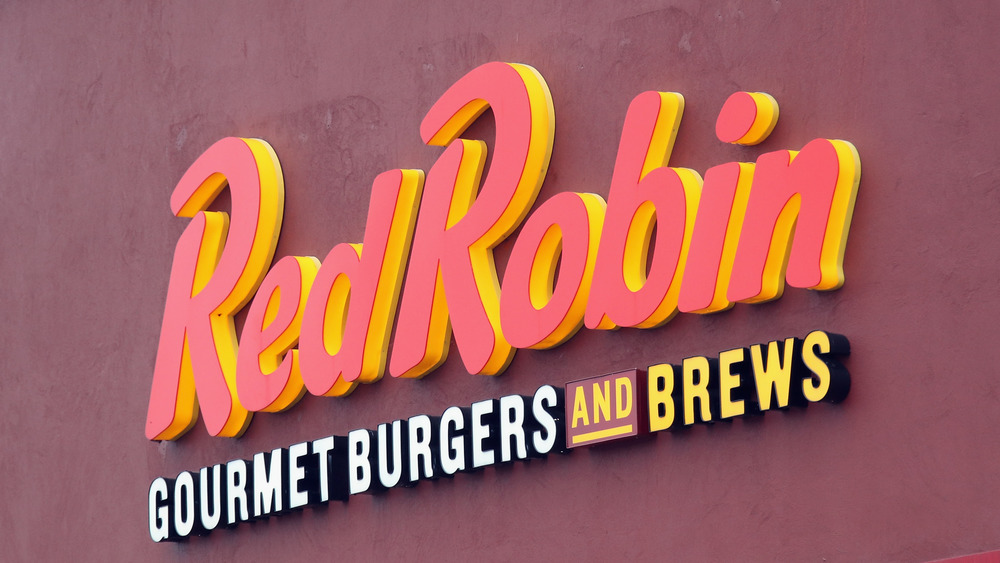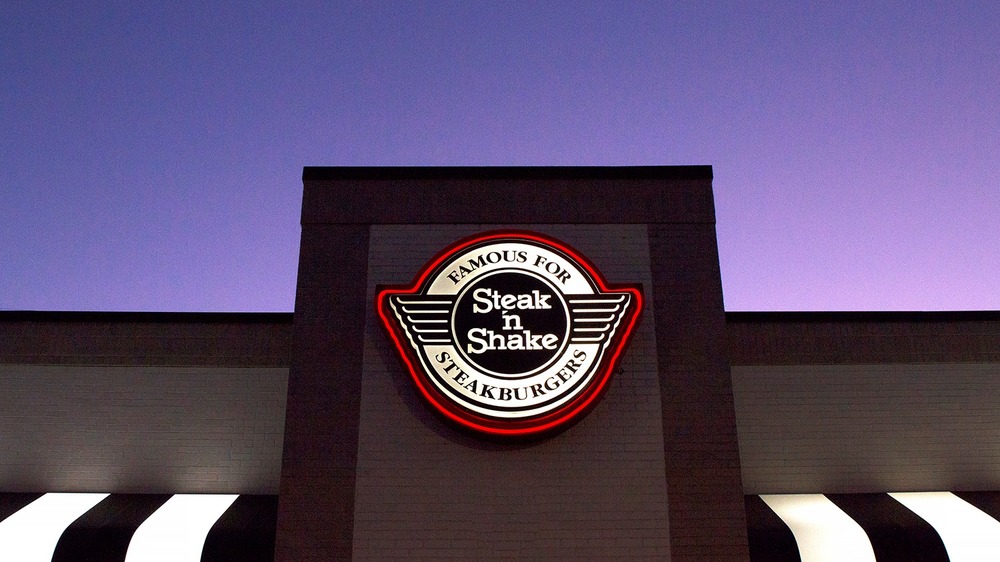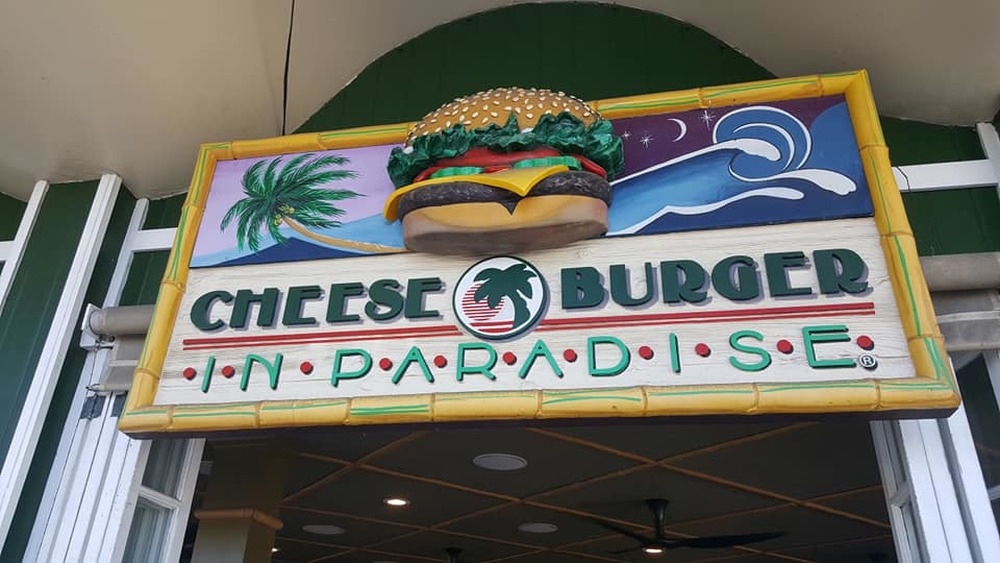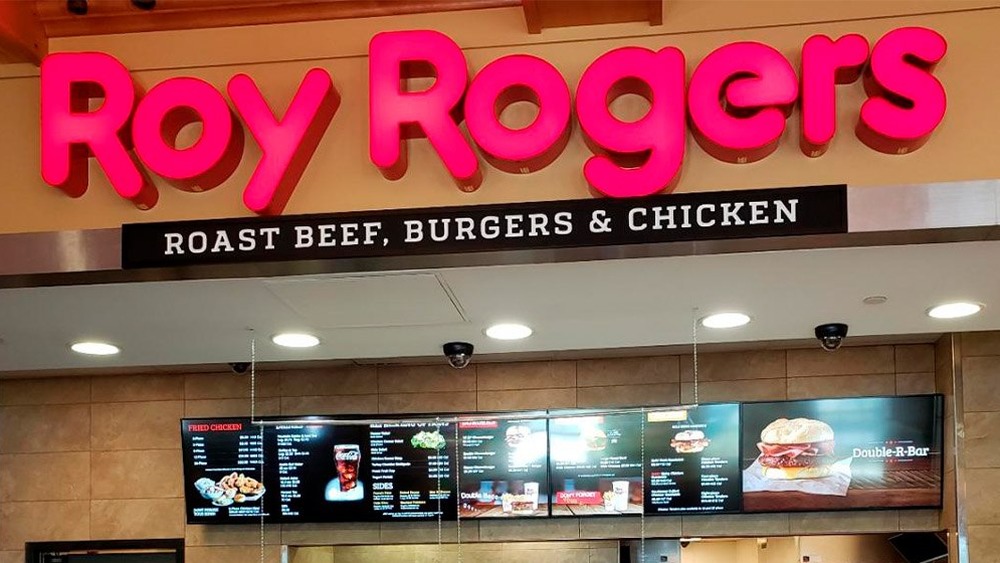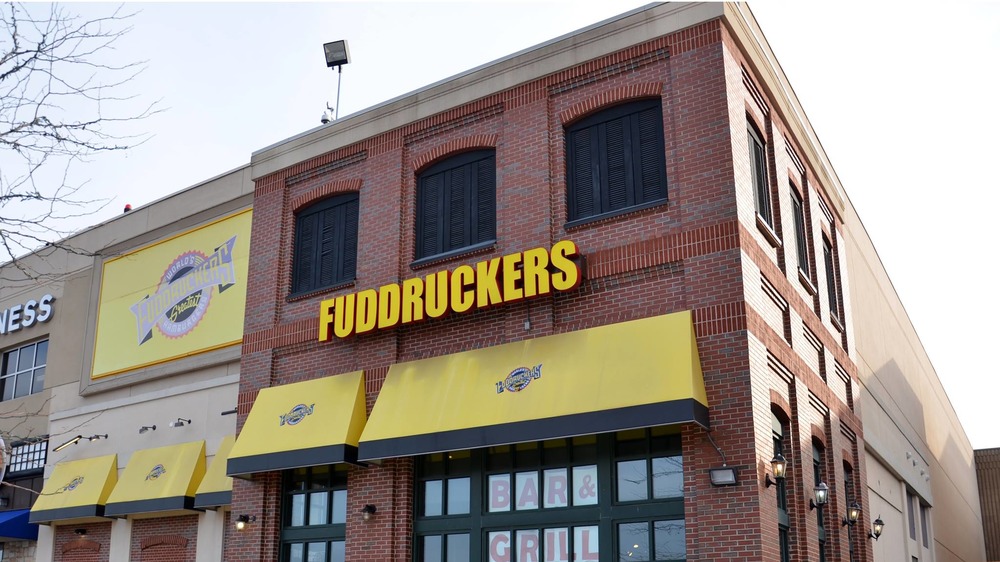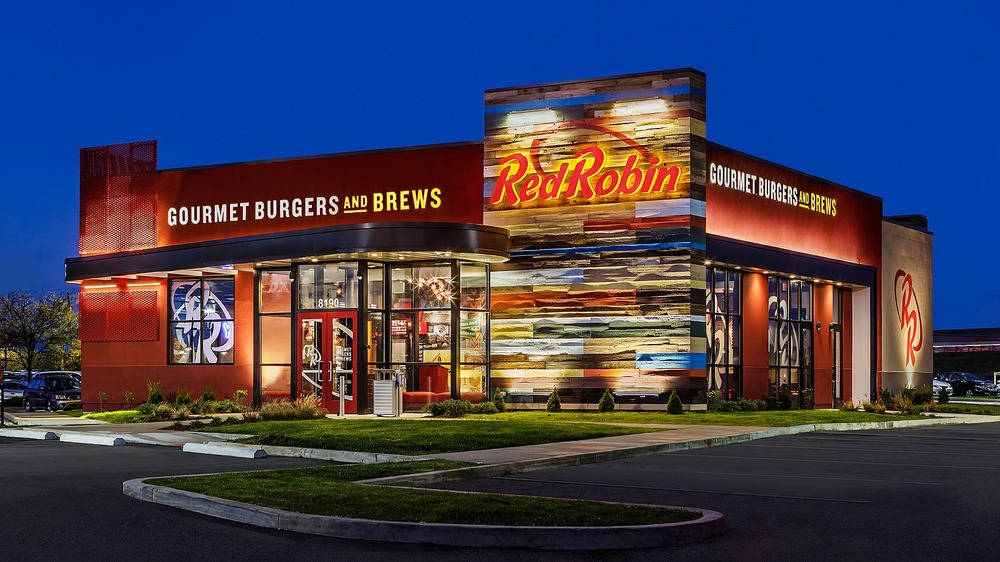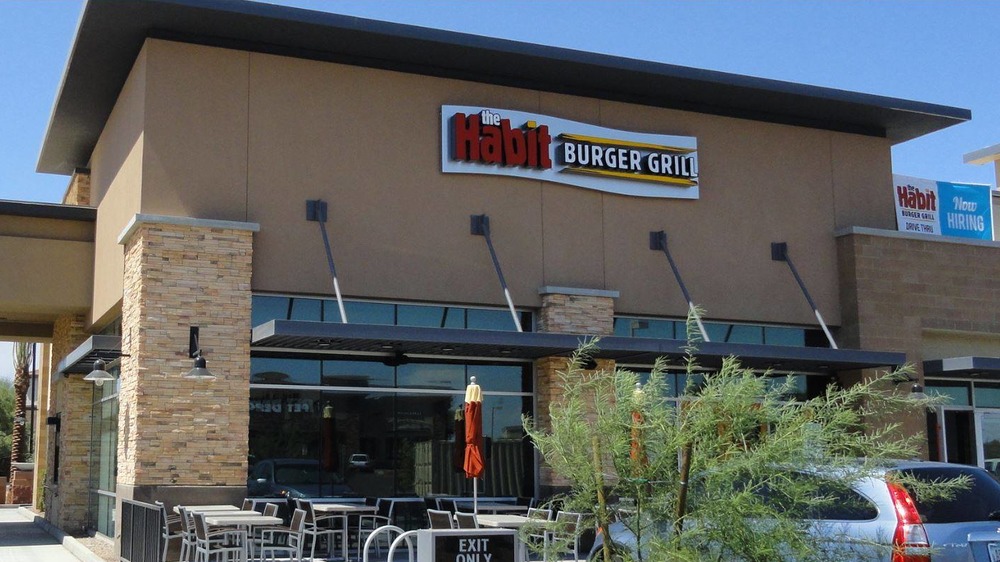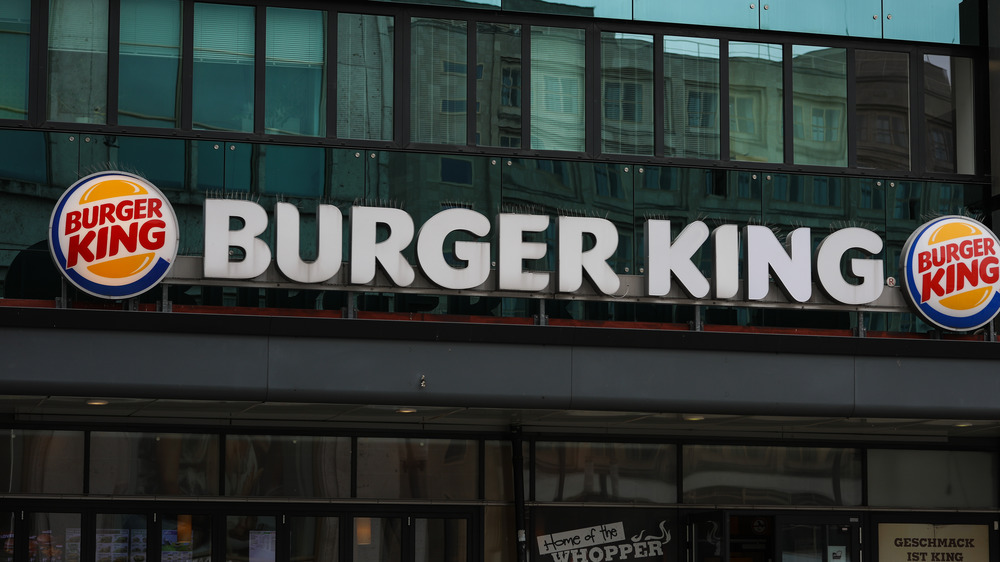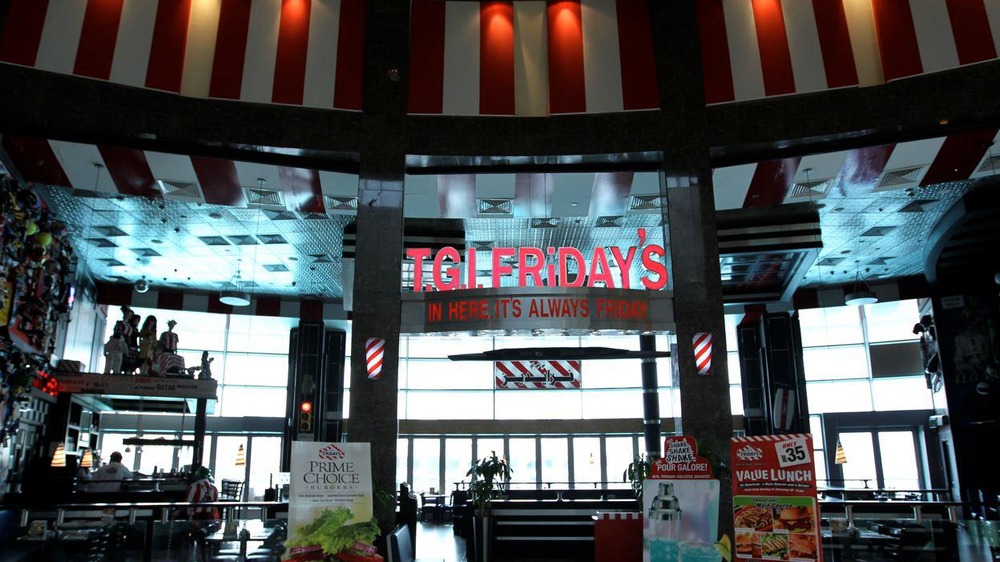Burger Chains That Are Disappearing Across The Country
Despite the potential health risks associated with red meat and the environmental impact of factory farming, Americans still love their hamburgers — on average, we consume about 50 billion every year. So it's no surprise the neighborhood burger joint has gone beyond, well, the neighborhood burger joint. So many Mom 'n Pop burger places started small, only to ultimately grow into the classic American chain restaurants we recognize on interstate exits from coast to coast today. Many of these dine-in chains flaunted a slight variation on the classic hamburger and as a result flourished through the end of the 20th century and into the 21st.
However, as Americans' habits have changed over the course of the last decade, many of the most popular family-style restaurants haven't always been able to adapt. Fast food burgers kind of have their own realm apart from family-style, dine-in places, but they've also struggled a bit in terms of keeping up with changing preferences and more conscientiousness around food sourcing and health. Then you throw in a global pandemic that forced many restaurants to close their dining rooms for several months? Forget it.
These are the burger chains that keep shutting down shop, making us wonder if they might definitely be closing for good.
Steak 'n Shake
If Steak 'n Shake is your go-to milkshake spot and burger chain, you better enjoy them while they last. The chain seems to be shutting down locations nationwide. Steak 'n Shake has been around since 1934 when it started with a mission to serve high-quality hamburgers (with beef ground on-site from prime cuts like round, sirloin, and t-bone) and milkshakes. The coronavirus pandemic has taken a huge toll on this country's restaurants, but perhaps the ones that were already struggling to stay afloat have suffered the most. By 2019, Steak 'n Shake had already closed over 100 locations. Since the pandemic set in, it has closed over 50 more, but its leadership claims it is still determined to stay afloat by accelerating its transitions to counter service and drive-thru rather than dine-in services.
Its parent company, Biglari Holdings, and its leader, CEO Sardar Biglari, wrote in the company's annual report that plans to revive the hamburger chain involve a new milkshake maker and efforts to speed up service. He said, "To be a market leader in the fast-food business, we should have paid greater heed to becoming, well, fast." It will be interesting to see if the chain's amped up, more fast food-oriented approach helps the surviving restaurants stay in business.
Cheeseburger in Paradise
You'll have to find another burger chain to live out your favorite Jimmy Buffet song fantasy. Cheeseburger in Paradise officially closed its final location in September of 2020. With beginnings in 2002, launched by the namesake creator Jimmy Buffett (who has been singing the famous "Cheeseburger in Paradise" song since 1978) in conjunction OSI Restaurant Partners LLC, at its height, the chain boasted 38 locations across 17 states. By 2012, when it was purchased by Texas company Luby's Inc, it had just 23 locations. The Luby's CEO stated that they acquired the chain because it would "nicely complement our core family-friendly brands."
High hopes dwindled as Luby's gradually started shutting down the restaurants over the course of eight years of ownership. The chain closed the last of its Indiana locations in 2018, leaving only outposts in Omaha, Nebraska, and Secaucus, New Jersey. The Secaucus one closed its doors in March of 2020 due to concerns around the COVID-19 pandemic, but didn't announce its official permanent closure until the following September. Since Luby's Inc, which also owns Fuddruckers and Luby's Cafeterias, has started liquidating assets, so it's no surprise Cheeseburger in Paradise was no longer able to hold on.
Roy Rogers
Roy Rogers is the only quick-service burger chain restaurant where you can choose between a hamburger, fried chicken, and roast beef. Unfortunately, that wide array of options might not be enough to keep this long-running East Coast/Mid Atlantic staple above water. At its peak, Roy Rogers had over 600 locations, but currently, there are fewer than 50.
Seven locations closed in 2019, despite efforts to revitalize since a failed attempt by Hardee's to buy the chain and convert the restaurants to more Hardee's locations. It had either closed or sold off most of the locations, leaving around 75 for the chain's original overseer Pete Plamondon's sons to contend with. The comeback efforts centered around appealing to a younger generation with creating a user-friendly app and increasing the variety of its offerings. The Fixin's bar used to be a huge appeal for Roy Rogers — guests could compile the condiments of their choice on their own burger — but now that the coronavirus pandemic has made any kind of buffet-style food service a big no-go, Roy Rogers can't really rely on that as a selling point.
It will be interesting to see whether this chain survives through continued changes in dining preferences in the United States.
Fuddruckers
We all knew this day would come, so you can shed your tears, but don't act too surprised. Fuddruckers' parent company Luby's, Inc. started unloading the struggling Fuddruckers restaurants to franchisees in January of 2019. Then in the fall of 2020, Luby's announced plans to liquidate all its assets, including its remaining Fuddruckers outposts. Certain Fuddruckers, like the three locations in Orlando, are still planning to operate under localized ownership.
But the chain itself has a long row to hoe, especially considering the coronavirus pandemic (sales plummeted over 90 percent this year, which isn't a good stat for the Club Fudd) and the overall slow demise of the family dine-in chain restaurant in America (with notable exceptions like Red Lobster). In May of 2020, there were only 40 Fuddruckers left, and 25 of those remaining burger chain restaurants weren't open because of coronavirus. The writing is sort of on the wall with this one, and that writing isn't, "Welcome to Fuddruckers!"
Red Robin
The first Red Robin restaurant started slinging hamburgers to Seattle residents in the 1960s. Known now for its gourmet burgers and bottomless steak fries, the brand grew and became a reliable burger chain through the crossover into the 21st century. However, in recent years, its over 500 locations have started to face the strain of changing dining preferences and competition from fast casual competitors. Red Robin closed over 30 of its locations in April of 2020 amid concerns over the coronavirus pandemic. But truthfully, the burger joint was already struggling.
The company capped 2018 with a whopping $10.6 million-dollar loss. A big part of their struggle was being located in so many malls, which themselves were on the decline with more shoppers gravitating to e-commerce and outdoor "lifestyle centers." It will be interesting to see what unfolds as the pandemic rages on, but we're not really sure if Red Robin will survive unless a serious revamp occurs.
The Habit Burger Grill
The Habit Burger Grill burger chain started in Santa Barbara, California, in 1969, touting its "charburger" made with "perfectly seasoned" beef alongside fresh California-grown produce. The restaurant ultimately expanded to include locations all over the world and was owned by the large Asian conglomerate, Yum! Brands, Inc. But in August of 2019, The Habit Burger Grill shuttered all three of its Orlando, Florida locations. According to a statement at the time released by Habit's President and CEO, Russ Bendel, the reason for the Orlando closings was solely due to poor performance in that particular market. "It was a difficult decision as our teams did an amazing job running the restaurants and serving our customers. We are grateful to all of the guests who supported our brand over the last few years," Bendel said.
Then in the spring of 2020, Yum! Brands, Inc. announced several restaurant closures for many of its popular establishments across the globe, including The Habit Burger Grill. It will be interesting to see how much they can bounce back after the pandemic.
Burger King
Perhaps one of the most iconic American fast food burger chains, Burger King, home of the Whopper, the debatable chicken fries, and that creepy King mascot, has certainly seen better days. In August of 2020, we learned that the King's parent company, Restaurant Brands International (RBI), plans to close hundreds of its underperforming restaurants, including Popeyes, Tim Hortons, and, yes, Burger King. Those chicken fries can't save you now, Burger King. (Did we mention the chicken fries really irk us?) Of course, Burger King had already closed over 40 of it locations due to the COVID-19 pandemic, but these more permanent closures certainly signal what a lot of bigger restaurant brands seem to be doing: using the pandemic closures as an excuse to put the nail in the coffin of restaurants that were already underperforming anyway.
Although this certainly doesn't mean the end of times for Burger King. In the process of announcing the changes, RBI reps relayed that while many Burger Kings are closing, it could be an opportunity to build newer outposts in more optimal locations. So while the Burger Kings might be disappearing, it might not necessarily be for forever.
TGI Fridays
Enjoying games and happy hour at TGI Friday's is apparently so 2010s. This once-popular hamburger and bar food haven has been closing restaurants left and right for a few years now. TGI Fridays shut down over 30 of its locations in 2019, then announced planned closures of another 70 or so in the late spring of 2020.
The coronavirus pandemic is partially to blame for the 2020 closures (despite efforts to instigate "al fresco" dining in the restaurants' parking lots), but let's not discount the effect of millennials shunning the family dine-in chain in favor of more fast casual options and fresher food. Platters of friend appetizers just aren't doing it for the 20- and 30-somethings — and if you're going to give them burgers, they better be gourmet ones. TGI Fridays might not survive this decade, but we'll never forget those loaded potato skins and all that unnecessary flair on the walls.
